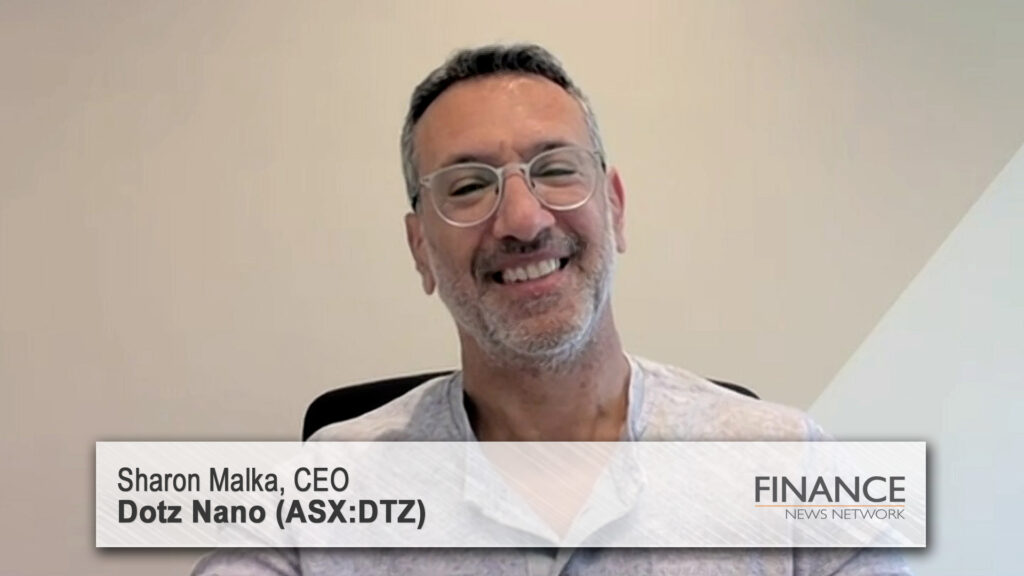Paul Sanger: Hello, I’m Paul Sanger for the Finance News Network, and today we’re discussing Dotz Nano. Dotz Nano, trading under the ASX code DTZ with a market capitalization of approximately $85 billion, is a nanotechnology firm pioneering innovative climate and industrial nanotechnologies. The company’s primary focus lies in developing revolutionary carbon dioxide management technologies, paving the way towards a carbon-neutral future. Joining us again is Dotz Nano CEO Sharon Malka. Welcome Sharon.
Sharon Malka: Thank you very much for hosting me.
Paul Sanger: Sharon, earlier today you announced the completion of the construction of a bench-scale unit showcasing the effectiveness of Dotz Earth technology, a significant achievement, especially as it was ahead of schedule. Firstly, congratulations to you and the team on reaching this milestone.
Sharon Malka: Thank you very much, Paul. We are actually very pleased with achieving this milestone ahead of the schedule and executing on our plans, and I believe it marks the company achievement of technology readiness progress, and we will further advance the technology readiness on its path to market viability moving forward.
Paul Sanger: Sharon, maybe you could delve a bit deeper into what Dotz Earth technology entails.
Sharon Malka: Yeah, it does. So Dotz Earth represents, from our end, the new generation of carbon-based solid sorbents. It utilizes pyrolysis process, which is a thermal heating process to upcycling plastic waste into a polymeric nanoporous sorbent, which is ideal to capture CO2 from industrial flue gas. The first application of this technology is our proprietary nanoporous carbon adsorbent, which demonstrates multiple advantages such as high walking capacity, fast kinetic, increased selectivity, and low cost of regeneration.
Paul Sanger: And look. Moving on to the actual bench-scale unit testing, I’ve heard there’ve been some promising early findings. Can you share with us a little bit more detail about that?
Sharon Malka: Correct. We were thrilled to see the validation testing and the process simulation results that we got, which demonstrated enhanced properties compared with the commercial carbon-based sorbent. And it includes greater adsorption capacity, better selectivity, and a reduction in regeneration energy. These results highlighting the potential of Dotz Earth sorbent technology to offer practical advantages for the future and drive down the cost of capture.
Paul Sanger: And the bench-scale demonstration unit was developed in collaboration with your partner, SINTEF. Could you provide some background on SINTEF and discuss the importance of this partnership for Dotz Nano’s future endeavors?
Sharon Malka: Sure. So SINTEF is one of the worldwide largest CROs for climate technology and, more specifically, for CCS, carbon capture and storage technologies. SINTEF brings extensive knowledge and experience in CCS technologies into this partnership, and together, this collaboration enables us to move forward quicker in advancing the technology towards its next stage of demonstration.
Paul Sanger: And on that point, what are the next steps following these encouraging preliminary results?
Sharon Malka: Sure. So the result of the sorbent validation testing and the process simulation demonstrate potential to significantly drive down the cost of carbon capture, and we will now be followed up with a design and building of a small-scale pilot unit to further the advance of the technology readiness on its path to market viability.
Paul Sanger: Sharon, again, congratulations to you and the broader team at Dotz Nano. Thanks for spending the time with us today. Much appreciated.
Sharon Malka: Thank you very much.
Paul Sanger: Thanks Sharon.
Ends.

